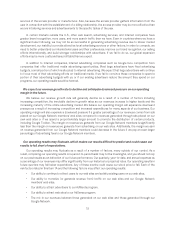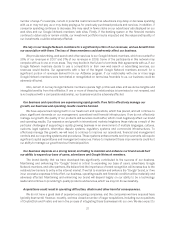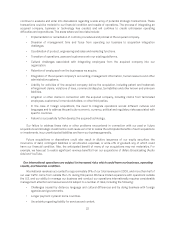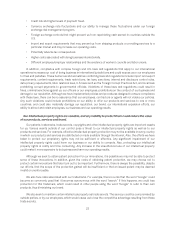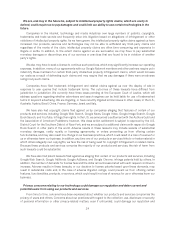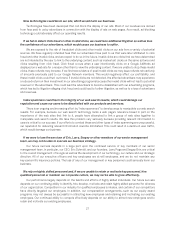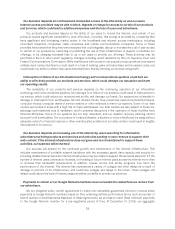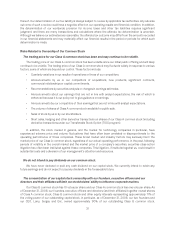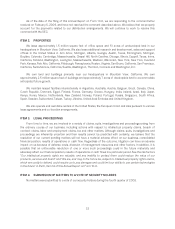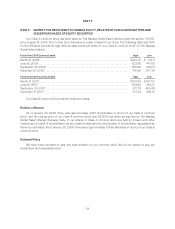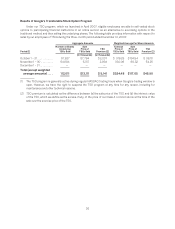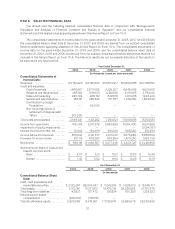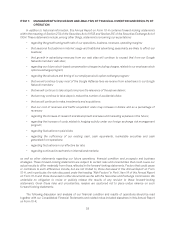Google 2008 Annual Report Download - page 45
Download and view the complete annual report
Please find page 45 of the 2008 Google annual report below. You can navigate through the pages in the report by either clicking on the pages listed below, or by using the keyword search tool below to find specific information within the annual report.Our business depends on continued and unimpeded access to the internet by us and our users.
Internet access providers may be able to block, degrade or charge for access to certain of our products
and services, which could lead to additional expenses and the loss of users and advertisers.
Our products and services depend on the ability of our users to access the internet, and certain of our
products require significant bandwidth to work effectively. Currently, this access is provided by companies that
have significant and increasing market power in the broadband and internet access marketplace, including
incumbent telephone companies, cable companies and mobile communications companies. Some of these
providers have stated that they may take measures that could degrade, disrupt or increase the cost of user access
to certain of our products by restricting or prohibiting the use of their infrastructure to support or facilitate our
offerings, or by charging increased fees to us or our users to provide our offerings. These activities may be
permitted in the U.S. after recent regulatory changes, including recent decisions by the U.S. Supreme Court and
Federal Communications Commission. While interference with access to our popular products and services seems
unlikely, such carrier interference could result in a loss of existing users and advertisers and increased costs, and
could impair our ability to attract new users and advertisers, thereby harming our revenue and growth.
Interruption or failure of our information technology and communications systems could hurt our
ability to effectively provide our products and services, which could damage our reputation and harm
our operating results.
The availability of our products and services depends on the continuing operation of our information
technology and communications systems. Any damage to or failure of our systems could result in interruptions in
our service, which could reduce our revenues and profits, and damage our brand. Our systems are vulnerable to
damage or interruption from earthquakes, terrorist attacks, floods, fires, power loss, telecommunications failures,
computer viruses, computer denial of service attacks or other attempts to harm our systems. Some of our data
centers are located in areas with a high risk of major earthquakes. Our data centers are also subject to break-ins,
sabotage and intentional acts of vandalism, and to potential disruptions if the operators of these facilities have
financial difficulties. Some of our systems are not fully redundant, and our disaster recovery planning cannot
account for all eventualities. The occurrence of a natural disaster, a decision to close a facility we are using without
adequate notice for financial reasons or other unanticipated problems at our data centers could result in lengthy
interruptions in our service.
Our business depends on increasing use of the internet by users searching for information,
advertisers marketing products and services and web sites seeking to earn revenue to support their
web content. If the internet infrastructure does not grow and is not maintained to support these
activities, our business will be harmed.
Our success will depend on the continued growth and maintenance of the internet infrastructure. This
includes maintenance of a reliable network backbone with the necessary speed, data capacity and security for
providing reliable internet services. Internet infrastructure may be unable to support the demands placed on it if the
number of internet users continues to increase, or if existing or future internet users access the internet more often
or increase their bandwidth requirements. In addition, viruses, worms and similar programs may harm the
performance of the internet. The internet has experienced a variety of outages and other delays as a result of
damage to portions of its infrastructure, and could face outages and delays in the future. These outages and
delays could reduce the level of internet usage as well as our ability to provide our solutions.
Payments to certain of our Google Network members have exceeded the related fees we receive from
our advertisers.
We are obligated under certain agreements to make non-cancelable guaranteed minimum revenue share
payments to Google Network members based on their achieving defined performance terms, such as number of
search queries or advertisements displayed. In these agreements, we promise to make these minimum payments
to the Google Network member for a pre-negotiated period of time. At December 31, 2008, our aggregate
29


